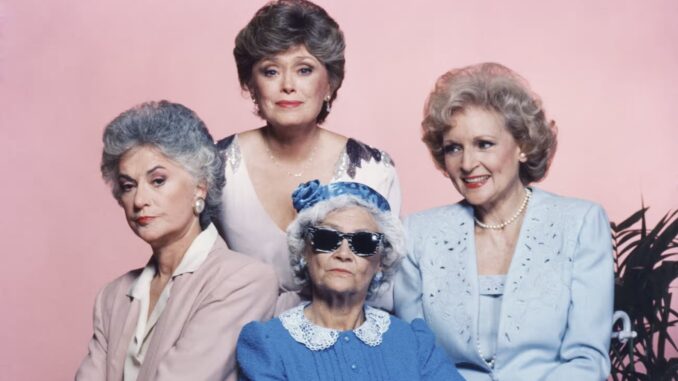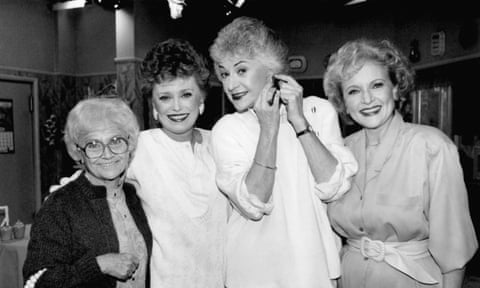
Azinger-infused maelstrom of shoulder pads, pastels and perms. Rattan furniture, DayGlo linen and Formica. There’s such a distinctive look, feel and vibe to The Golden Girls, the iconic sitcom that ran from 1985 to 1992, scooping up 68 Emmy nominations and 11 wins in the process. The brainchild of producer Susan Harris, the show spawned several acclaimed spin-offs and became an enduring work of high camp in the process.
The premise? Three older women decide to live together: the stern, witty ex-teacher Dorothy Zbornak (Bea Arthur), the sweet but fantastically dense Rose Nylund (Betty White) and southern hornbag Blanche Devereaux (Rue McClanahan). At first it’s a matter of convenience, but before long, they become fast friends. During the pilot they’re joined by a fourth: Dorothy’s mother Sophia Petrillo (Estelle Getty), a nitpicky little shrew whose ability to cockblock our heroines saw her gradually become the Scrappy-Doo of the house. (Don’t @ me, Goldies, you know I’m right.)
For a comedy that primarily took place within a Floridian kitchen, The Golden Girls boasted some serious talent. The four leads were all astoundingly adept at their craft – for a hint of the comedic masterclass threaded throughout the show, check out this exchange from season one episode The Way We Met, in which White has McClanahan and Arthur corpsing on-camera (to the showrunners credit, they used this take).

The Golden Girls dealt with some big-ticket issues: mortality, fidelity, racism, depression. Dorothy frequently contends with her gambling addiction. The spectre of the HIV-Aids crisis rears its head after Rose undergoes a blood transfusion. We even meet Blanche’s gay brother and his partner. The Golden Girls remains staggeringly popular in the LGBTQ+ community – it’s one of Ru Paul’s favourite shows, in fact – in part because of its heightened, kitschy sass, but also because it was fearless when it came to issues that most other shows were too scared to tackle.
Or maybe it’s because the golden girls themselves proved that the family you make is sometimes stronger than the one you’re born with. Dorothy, Rose and Blanche feel, at times, aged out of their previous lives. Careers, spouses, the world: all seem to be pushing them away. But the girls are proof that you can – and should – forge new bonds, even if it seems like your old life is done for. That you can make a new family, even if your old one rejects you. And if that isn’t a mirror for the queer experience droves of people have after coming out, I don’t know what is.
The Golden Girls pulled back the curtains on ageing, showing the ways in which old people can be flawed, passionate, monumentally stupid, brave – even at times, almost heroically horny. And it did so with an almost reckless willingness to be as wildly funny as it possibly could.
The show ended up doing what many sitcoms do: use antagonism as heat to push the plot forward. It takes truly hack writers to defend needless antagonism as the only source of fuel to propel a story (I’m looking at you, post-Sorkin West Wing). The last two seasons of The Golden Girls aren’t terrible, but Sophia morphs from an old lady without boundaries to an ancient sociopathic prankster. But even with this odd acceleration towards a caricatured sitcom event horizon, the show still manages to roll out the hits. The two-part finale, written by Mitch Hurwitz (the creator of Arrested Development) and starring Leslie Nielsen as Dorothy’s love interest, ranks as some of the best in the show’s history.
It also has – and I cannot stress this enough – the best sitcom theme song in the history of sitcom theme songs. In 2023, there are few things that will haul you out of whatever psychic muck you find yourself in than whacking on an episode of The Golden Girls. I promise you, once the credits roll, you’ll find yourself lying on the lanai in your mind, feeling somehow much lighter than you did before.
